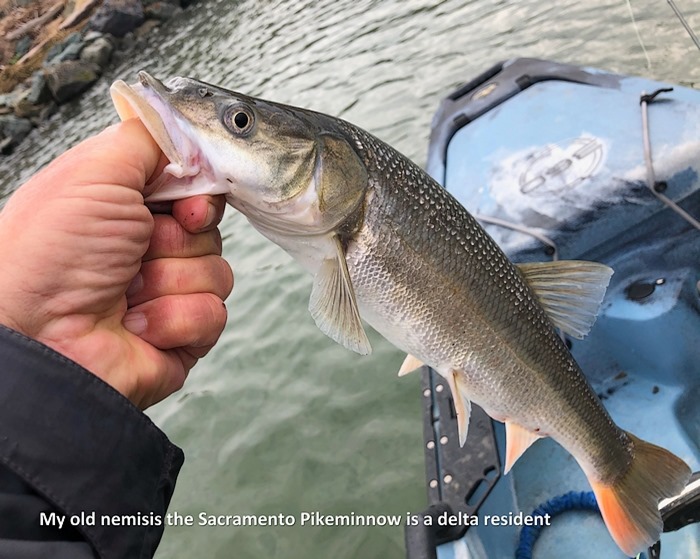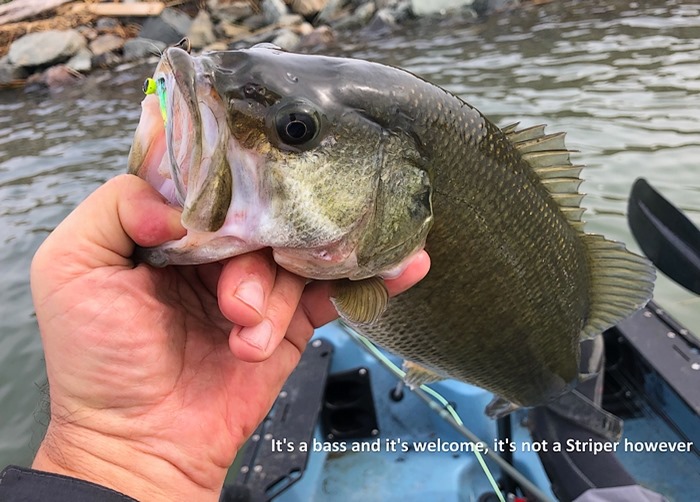I’ll go out on a limb and suggest our sport could use a few pedigreed opponents with both table manners and appetites of a Tyrannosaurus Rex.
I’m thinking selfishly naturally, but think of all the knick-knacks we could remove from our vest, the words – like “gossamer” or “refined” we could purge from our vernacular, and the Jihad we could embrace as we rose to defend all the little kids and sunbathers frolicking at the beach …
I met one of those yesterday, and only managed to fight him to a draw.
Now I’m nursing the bruises and teeth marks, the line burns and the wounded pride that comes with knowing that had I hooked up with a real Striper I might have suffered the same fate as Jonah, swallowed whole by a great fish.
The tides were favorable the last couple of weeks so I tried Sherman Lake twice on Thanksgiving week. The Tuesday of that week was great weather and no fish, and the following day featured gale force winds that pushed the fly line (and sharp 2/0 hook) into the boat, while pushing me and my craft towards the rock jetty. Choosing between being skewered and a watery grave made the remaining option – a hasty retreat back to the launch area, the only viable alternative.
Fish 1, Me Zip ..
This week promised a return to calm air and a continued spate of middling temperatures, so I returned to the waterway on Tuesday in pursuit of my first fly-caught Striper.
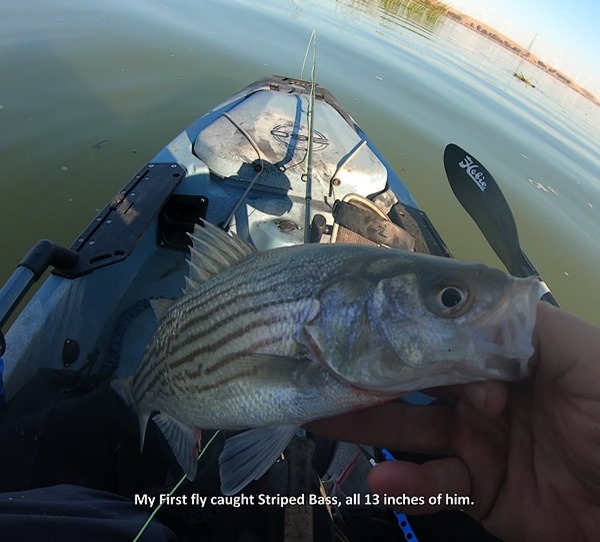
I don’t know which of us was more surprised, him … as he’d swallowed a fly that was half as big as he was – or me, who was expecting a Pikeminnow or small largemouth. The sure gluttony exhibited by my new pal gave me pause, as he had swallowed a 6” White Whistler… completely. (I had to remove the fly with pliers quickly – as I feared it would be digested before I could release the little Beast.)
This encounter got me thinking of the overall sport – how the evolution of the Genteel Angler; the woodsy Plaid shirts, and Pipe smoke of the Crosby era might have fared with silvery T-Rex’s inhabiting traditional Trout turf. Would we have been so eager to wade knowing the carnivorous little beasts could knife through your Seal-Dri’s and take your leg off at the knee?
Finally, this … was an adversary worth killing.
My thirteen inch nemesis whetted my appetite for additional carnage, and I continued flinging my six inch offering at anything that looked promising. As the tide came in I had two more brief flurries of activity, a good sized largemouth ate the fly before losing the hook, and what I assumed to be another 13” glutton slammed the fly before also coming unbuttoned.
I returned the following day to fish this same general area; the northern edge and the three islands at the entrance to the Sacramento, as well as part of the northwest shoal of tules and floating water hyacinth.
As there were a half dozen boats in the center of Sherman Lake, I assumed some fish had been caught recently – half appeared to be bait fishing and the balance were casting lures and plugs of some sort. I had a lone fly fisherman roar up to my side and we both drifted with the incoming tide towards Antioch.
I was flinging my usual fare, 2/0 White Whistler, whose hook I had touched up to razor sharpness, when I was slammed by another Striper, this one a bit bigger. As I was out of sight of most of the boats I didn’t mind the noisy complaint from my old click-pawl reel – as I knew I was out of earshot of the flotilla jockeying in the center of the waterway.
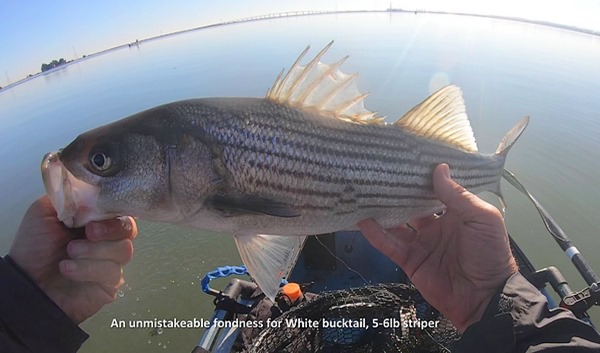
After towing me around a bit I managed to boat the Glutton and retrieve the offending White Whistler from his maw. Apparently my comment to the smaller fish, “…and return with your Big Brother!” had been followed to the letter – and while a 6 pounder is not a big fish, it was the prettiest thing I had seen in some time. I smuggled him off the deck and back into the water without commotion, hoping to remain unobserved.
Most of the small fleet of boats had left the center of the lake and moved either north (to the Sacramento) or south (to Big Break) and I was in sole possession of the area. I have a theory that the amount of horsepower present is indirectly proportional to attention span, and their owners tend to hop about making use of all those carbon credits – to the detriment of their fishing.
I managed to catch a largemouth and another 13 inch striper while pedaling in the area. The fact that every species will eat the same fly is a real treat. Fly fishermen are quick to change fly if the fishing slows and it’s nice to simply face the mathematical odds of a fish being able to see your fly, and no activity means no fish, versus something more sinister like the wrong phase of insect or it’s abdominal color.
I swapped sides of the lake and fished down the rock jetty portion and landed a third Striper similar to the first.
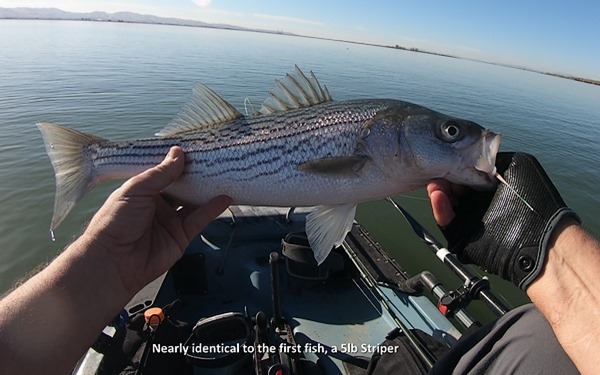
To say I was ecstatic is an understatement. These fish are brutal fighters capable of towing my small craft in the ensuing tussle. I am rethinking a bit of my tackle in preparation for meeting the larger fish common to the area. Currently I am tossing an 8 weight 10’ Echo on a WF floating line, but may need to increase capacity a bit to allow for additional brutish behavior should the fish be in excess of 10 pounds.
Towed into the center channel of the Sacramento would be thrilling until the first freighter appeared …
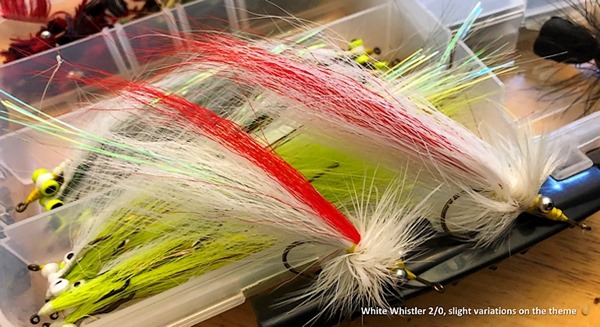
As I have an overabundance of Yellow NYMO thread, the Whistler’s tied above are tied with a few random changes. The classic is a white-red-white layering of the wing, but I also tie the fly with the red on top. I suppose some years I feel “extra bloody,” and some I adhere to the classic dressing.
In summary: The fish are starting to show but are not yet in great numbers. I have managed to land a Striper on a fly rod – which was a Bucket List item, and while I’ve caught numerous Stripers on conventional tackle, am really impressed at their fighting ability on a light fly rod (and smallish fish).
Angling Conditions: Water temperature 58 degrees, ambient temperature 65 Degrees. One fish caught at low tide, one caught on incoming, one caught at full high tide.



